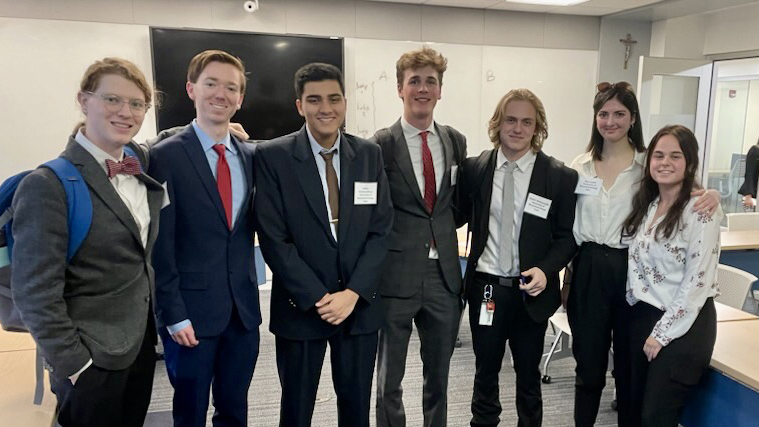UMD Ethics Bowl is Top 4 Team in Country
April 11, 2023

The team advanced to the semifinals last month at the National Intercollegiate Ethics Bowl in Portland.
By Jessica Weiss ’05
As growing divisions confront Americans in their communities and their politics, a group of UMD undergraduates is focused on engaging in thoughtful, measured debate about some of the stickiest issues of our time.
Last month, the University of Maryland’s Ethics Bowl team became a top-four team—out of nearly 300—in the country, after beating the 1 seed University of Chicago to make it to the semifinals at the National Intercollegiate Ethics Bowl in Portland, Oregon.
Ethics Bowl teams explore and analyze a range of contemporary moral questions—from free speech to artificial intelligence to abortion—to delve into the multiple ethical dimensions of a given case. At competitions, participants face off in a number of discussions with other teams. A panel of judges probes for further justifications and evaluates the answers.
UMD’s 2022–23 team, housed in the Department of Philosophy, was made up of six students with a range of majors and coached by philosophy Ph.D. student Cody Britson. None of the students are philosophy majors, and four of the students were first-time participants.
“Magic definitely happened among our team this year,” Britson said. “We came from diverse backgrounds and had different politics and ideas but all had a deep passion for developing an understanding of ethics and how it applies to the issues that shape the world around us. It’s impossible to describe how awesome the experience was.”
Beginning in the fall, the team met twice per week for discussion and practice. Often, Britson would begin meetings with a small philosophy lecture, both on foundational topics and more specific case material. Outside of meeting times, students continued to study cases and develop arguments, frequently sending Britson late-night texts with questions.
Team member Jake Leming, a sophomore history major, said he “didn’t really know anything about ethics” before this year.
“I definitely had my mind opened through this experience,” said Leming, who also plays club lacrosse. “There’s so much to learn and this is something I’ll continue to do for the rest of college.”
(Additional team members included: Quin Zabel ’24, chemistry and biochemistry, environmental science and technology; McKenzie Funk ’23, biology; Aditya Chattopadhyay ’26, computer science; Dimitri Sfakiyanudis ’24, economics; and Daniel McLawhorn ’24, electrical engineering.)
In December, UMD won against three teams at the northeast regional qualifier at Villanova University in Philadelphia, earning a spot at the national competition in Portland in March, where 32 teams competed to determine the overall best team in the country. After going 3-1-0 in an initial round-robin, Maryland faced Chicago in the quarterfinals with two cases concerning the value of art and the permissibility of free speech zones, respectively. Despite an extremely close match, Maryland unanimously convinced a panel of judges they had a better mastery of ethics.
Britson described it as “an astonishing upset” and an “incredible moment.” Though Maryland lost to Tufts in the next round (who in turn lost to the Naval Academy in the finals) they were “extremely proud of what they accomplished,” Britson said; the team enjoyed the rest of the tournament as viewers and even toured Portland.
“The goal was never even really to win, but just to have really good conversations, and leave feeling like we learned a lot,” Britson said. “We certainly achieved that.”

